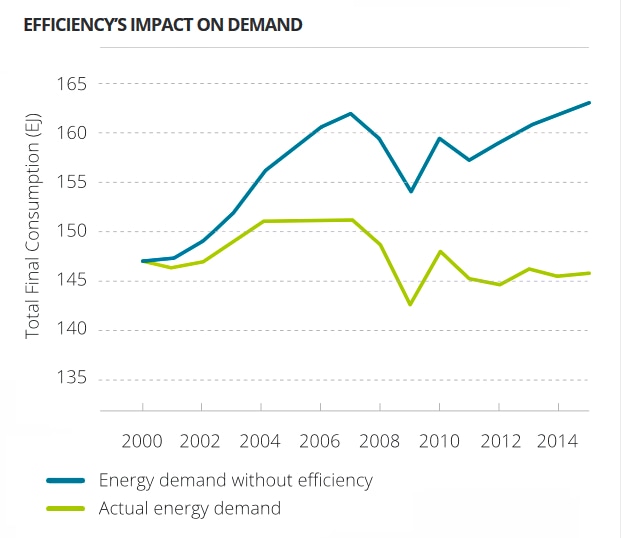|
As governments and businesses all over the world focus on how to meet our commitments to reduce carbon emissions under the recently ratified Paris agreement, we thought it would be worth the while to outline the impact that energy efficiency alone can have. According to the International Energy Agency ("IEA"), "there are no realistic or affordable energy and climate change policies without a sizeable and vigorous energy efficiency component." This certainly makes sense, given that more than half of the energy we use as a society is lost somewhere along the way due to inefficiencies --- meaning the potential represented by energy efficiency is larger than all of the other forms of fuel combined. So the potential is huge. But what kind of an impact has energy efficiency actually made? Well, since the year 2000, energy efficiency kept energy demand in check, despite our growing economies and population around the world. In fact, had efficiency levels not improved, energy demand in IEA member countries would have been 12% higher - surpassing the 2007 peak in 2015. In other words, as a result of improved energy efficiency, the global economy needed less energy to grow. In 2015 in IEA countries, energy efficiency alone avoided the consumption of 870 million barrels of oil, 205 million tonnes of coal, and 224 billion cubic meters of natural gas. This reduction in fossil fuel consumption resulted in a reduction of greenhouse gas emissions of about 1.5 gigatonnes. That's huge, and that was just in one year. At Thermal Energy International, we're proud of the contributions our proven energy efficiency solutions have made to reducing energy demand and carbon emissions. To date, our energy saving products installed around the world have provided estimated energy savings of more than $408 million while reducing carbon emissions by approximately 4.3 million tonnes. Manufacturers, industrial operations, hospitals and other institutions around the world can benefit from investing in energy efficiency and do their part to help reduce greenhouse gas emissions. But governments around the world must also play a central role in driving energy efficiency through policy. And, there are several reasons why governments should fully embrace energy efficiency, in addition to being the most cost-effective way to help meet their Paris commitments. These reasons include:
Energy efficiency policies aim to deliver the maximum amount of social and economic benefit from the energy we use. For that reason, they are essential tools for government action that have a huge impact on global energy demand and emissions reductions. Want to help make an impact? Share this post with your government officials, including environment ministers and economic development ministers. Plus, if you don't already, please follow us on Twitter.
0 Comments
|
Archives
August 2021
Categories
All
|


 RSS Feed
RSS Feed